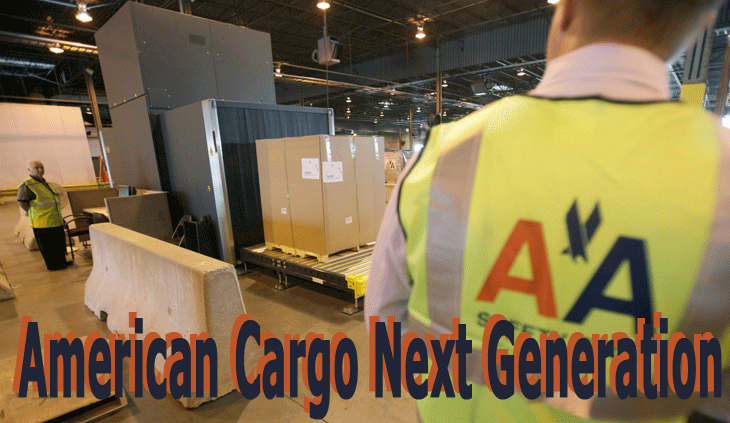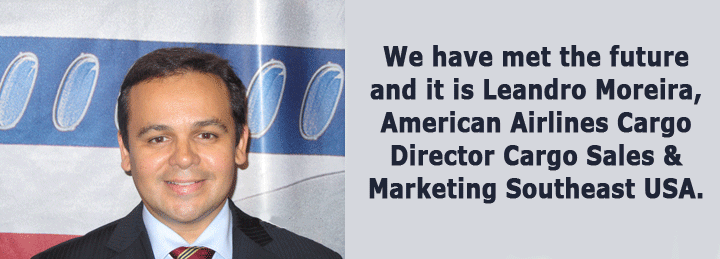NextGen Sales
American Cargo Future 
On September 10, 1813, after defeating
the British fleet in the Battle of Lake Erie, Oliver Hazard Perry, commander
of the American fleet, dispatched one of the most famous messages in
military history to Maj. Gen. William Henry Harrison. It read:
"We have met the enemy, and they
are ours.”
I have always remembered that statement,
perhaps because I was born and raised in the State of Ohio (Toledo)
and was born on September 10, 1941.
I recall that whilst working as copy boy
at the old New York Herald Tribune (the great daily populated by Irish
that exists today only in Paris, and is now owned by the dreadful New
York Times), I supplemented my $46 dollar-per-week wages by serving
as a runner for the sports book operated by the NYHT pressroom guys.
My route used to include picking up and delivering money bet by various
people at Blake’s, a saloon on 40th Street where the writers drank
all day, before working all night on the next edition.
There they all were, belly up to the bar—Pete
Hamill, Jimmy Breslin, John Crosby, Walt Kelly and others.
Kelly, it should be remembered, drew the
wonderful, satirical, adult humor comic strip called Pogo.
Google Pogo and see for yourself.
 |
Anyway, Walt thought about that quote
from Admiral Perry as the Vietnam War was raging and drew a social commentary
strip about America in the late 1960s. He called it:
“We Have Met The Enemy And He Is
Us.”
The last time I saw Walt was after I was
drafted into the US Army and assigned to duty for 13 months in Vietnam.
He kindly drew the likeness of Pogo on a cocktail napkin with the inscription:
“Dear Geoff, Hope that Saigon will
soon be bye gone.
“Good luck from Walt Kelly &
Pogo.”
I guess it is funny how you remember things
like that, but for whatever reason those days came to mind when I was
sitting in a big empty meeting hall between sessions at Air Cargo Americas
a few weeks ago. I was talking to a bright faced, absolutely brilliant
young man from American Airlines Cargo.
What he outlines is called Next Generation
Cargo Sales, and after a few minutes it becomes clear:
We have met the future and it is Leandro
Moreira, American Airlines Cargo Director Cargo Sales & Marketing
Southeast USA.
“Next Generation Cargo Sales (NGCS)
is a project that we started about a year and a half ago.
“Right now NGCS has pretty much
changed the way we do business; how we interact with our customers and
what we do, demonstrating that at the very least we as a cargo resource
airline have also become much better marketers.
“What we are doing is taking our
offering the extra mile.
“Our approach is no longer just
going to our customers with statements like ‘we have the space.’
“NGCS shares our expertise and expands
thinking about market opportunities to our customers along with exploring
various protocols.
“So in practical terms, American
Cargo is now the airline that is specialized in various markets, such
as pharma, offering the total dedicated capabilities and shared business
intelligence about market conditions and opportunities to our customers.
“In 2008, for example, we launched
ExpediteTC as an active solution for pharmaceutical companies.
“Just this past September (2011)
we took that product to the next level, introducing Expedite TC Passive,
expanding that product offering.
“Today we are very much solution-driven
at American Airlines Cargo offering global reach and local knowledge.
“Our idea is to be well versed and
to know the flow of products to the communities we serve and have awareness
of the opportunities for business that are also special to our destinations
around the world.
“I am based in Miami and join people
from all around the system who are working on both developing and implementing
this new set of core values of NGCS.
“It’s an exciting time at
AA Cargo.
“For example, here in Miami, inside
sales teams have a tendency to be basically an inbound call center,
but now we are moving out of an accepted traditional airline call center
role by expanding our local reach out into the market, extending our
offering to small and medium sized enterprises.
“The impact on the customers has
increased and there is a two way idea exchange and the growing knowledge
and acceptance that we actually care and know something about what our
service partners are thinking and expect from us.”
Leandro Moreira joined American Airlines
16 years ago, but he looks young enough today that you might think AA
robbed a cradle to hire him.
Leandro laughs at that one, saying:
“I like to say that my parents forgot
me at the airport so I went right to work for American.”
“I’ve worked at various jobs
at American including as manager of airport services here in Miami.”
Leandro also worked at JFK and for a while
was manager of flight crews.
“The thing about air cargo that
is both surprising and great is the wealth of information you get back
from the kinds and volumes of air cargo in the shipping lanes.
“For example, air cargo is a great
economic indicator; when you see strong trade, that is a clear indication
of economic performance.
“I actually started in air cargo
during the 2008 downturn, so to see the business come back and to be
part of the innovative approach American Cargo takes toward building
both its own business and air cargo as well is indeed exciting and challenging.”
Looking ahead (and back) for a moment,
Mr. Moreira said that while 2010 was certainly a good year and 2011
into 2012 has its question marks, “the Latin American economies
like Brazil, Argentina and Chile continue to perform well.”
You talk to Leandro Moreira and what bubbles
up in the conversation repeatedly sounds like a new chapter, even a
whole new book, being written at this critical station.
A big plus being felt all over the American
Airlines Cargo system is the network allocation program implemented
in Miami.
“The idea is to move traffic efficiently
that originates both in Miami and because this is a hub to and from
Latin America as well from Europe and Asia and elsewhere.
“However, a lot of times when local
customers in the past would ask us for space on airplanes, we said no
too many times based on the traffic we had coming from up line stations.
“So last year we instituted the
concept of network allocation.
“What we did was determine the price
point that would allow (local) customers to get their cargo on any airplane
and at the same time would allow us to harmonize with the traffic already
in the stream.
“So now with network allocation,
local customers get needed access and we are able to maximize revenue.
“It just works out all around.”
Looking ahead, Mr. Moreira says job one
for AA Cargo is to be “more visible to our customers.”
Geoffrey Arend/Flossie |




